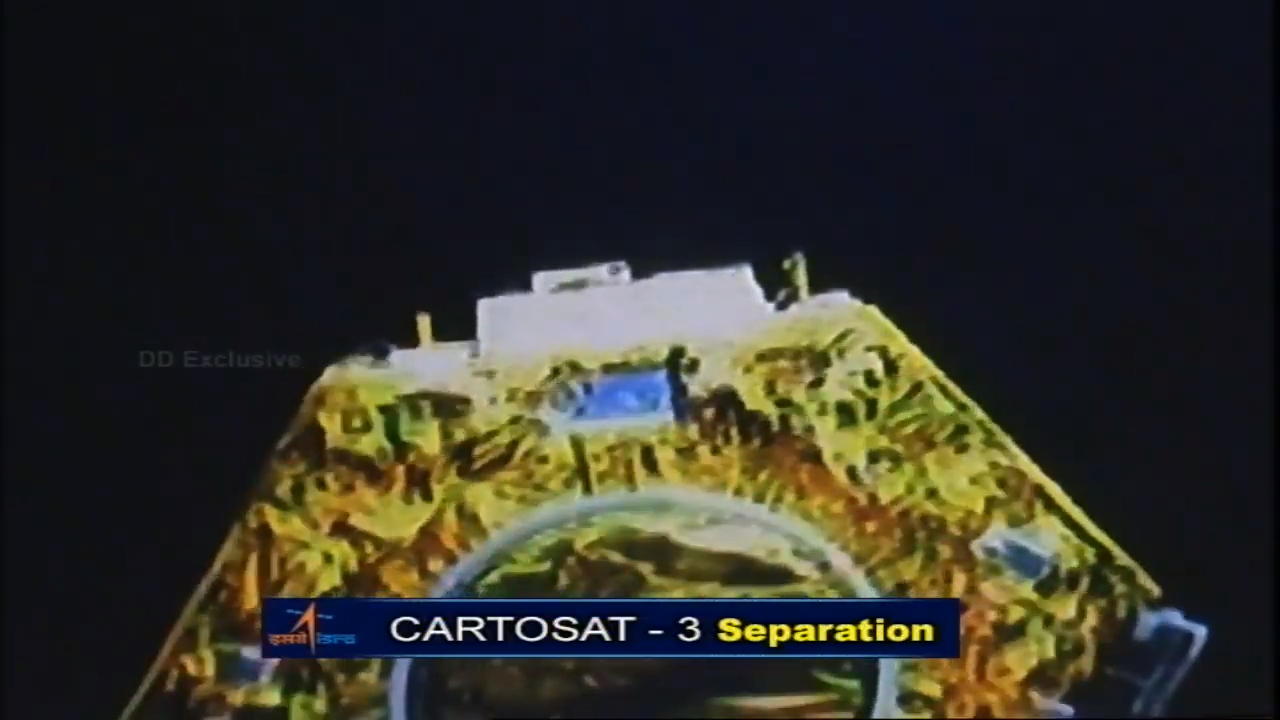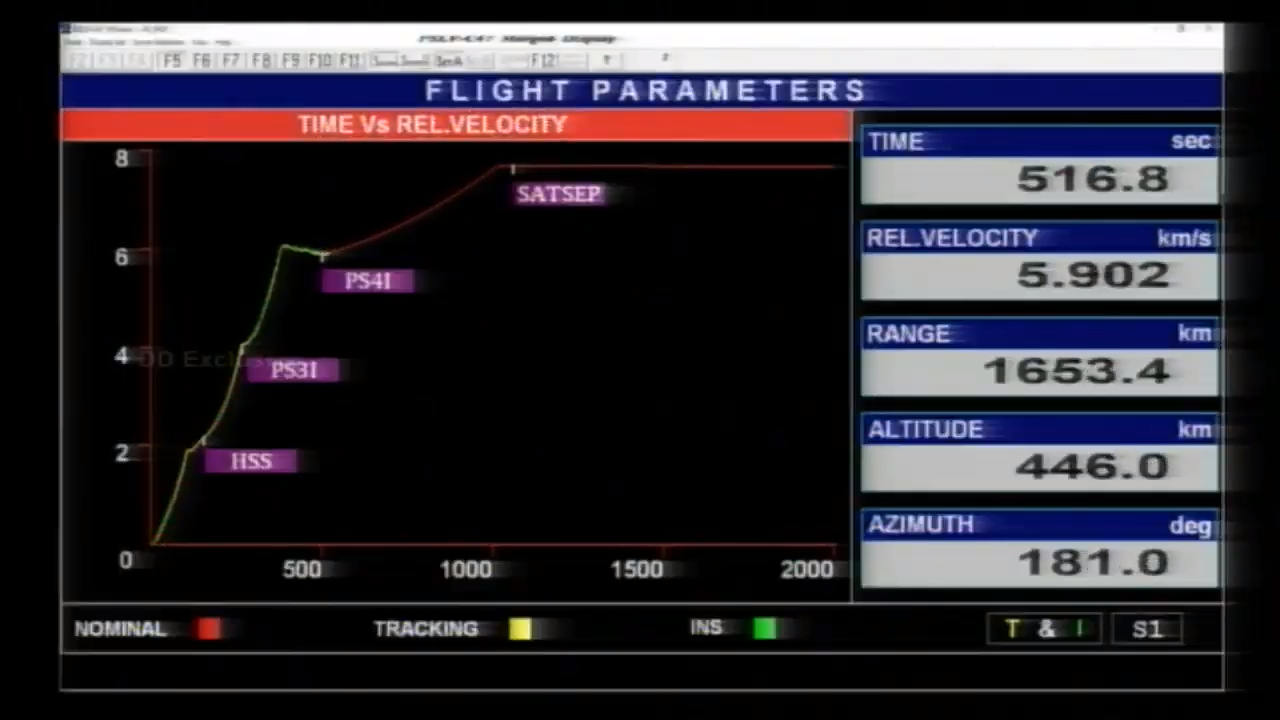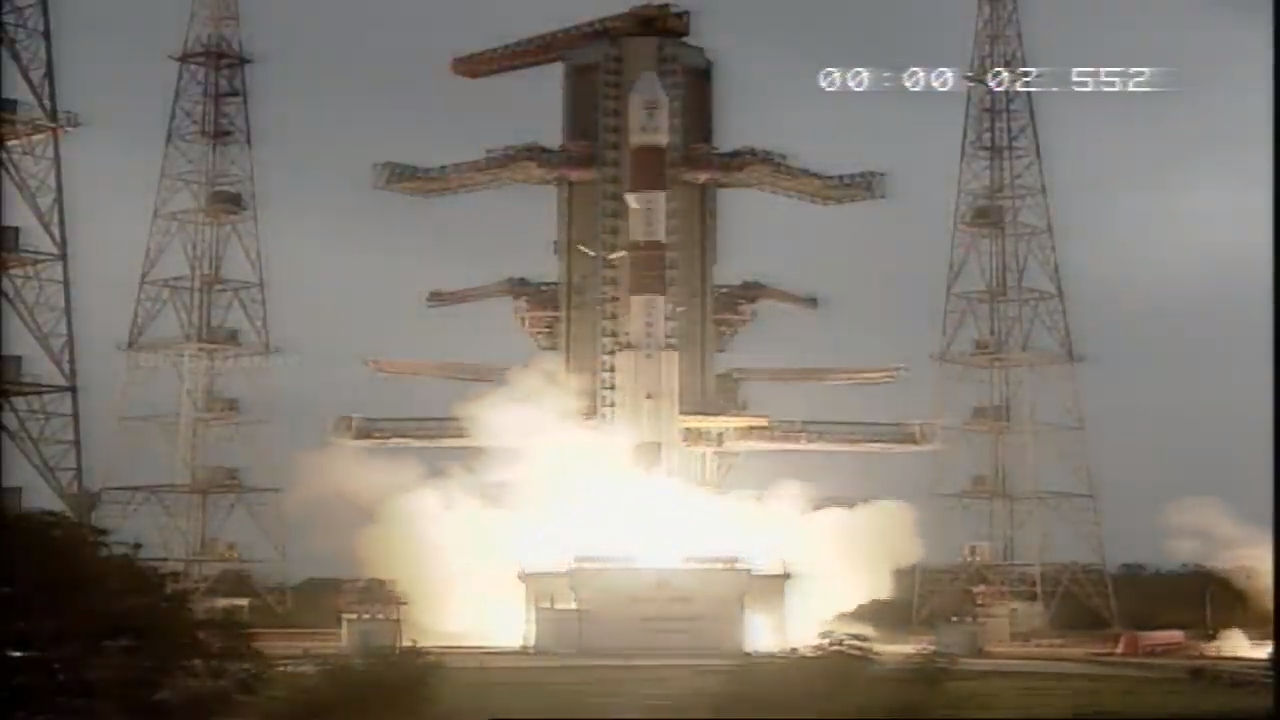09:48 (IST)
Meshbed satellite separated
The 'Meshbed' satellite has successfully separated from the fourth stage.
09:47 (IST)
CartoSAT-3 satellite has successfully separated
The CartoSAT-3 has successfully separated from the fourth stage.
09:46 (IST)
Fourth stage shut off
Optimal orbital conditions have been achieved and the satellite will be injected into orbit soon.
09:38 (IST)
Third stage separated
The third stage of the rocket has separated and the fourth stage has started.
09:33 (IST)
Second stage of the rocket has separated
The second stage of the PSLV-C47 has separated and the third stage rocket has ignited, functioning normally.
09:32 (IST)
Payload fairing has separated
The heat shield on the rocket has separated.
09:31 (IST)
First-stage separated
The first stage of the rocket has separated and the second stage engine has fired up, functioning normally.
09:29 (IST)
And it's a lift-off!
The PSLV-C47 is up in the sky and ISRO confirms a successful launch blasting in full power.
09:26 (IST)
Other payloads on the PSLV-C47
Apart from India's CartoSAT-3, the launch will also include 12 SuperDove "Flock" satellites, and a communication satellite technical proof-of-concept satellite called "MESHBED". The SuperDoves, developed by Planet Labs, are part of a network of smallsats designed for earth observation. These satellites, an upgraded iteration of the 26 "Doves" already in orbit, offer higher imaging quality, sharper images, more vibrant colors, and increased accuracy for advanced/time-series analysis. If successfully launched, Planet intends to expand its network with more such SuperDoves, and bring them closer to a planned project the "Next Generation Planetscope".
Analytical Space Inc's (ASI) satellite on the PSLV-C47 is a technical demonstration. With its 'Meshbed' satellite, ASI intends to test a space technology that will allow its users (on Earth) to gain faster access to data from satellites. The spacecraft features a patented, inexpensive antenna design from MITRE that could help enable faster access to space-based data. It can be used for a variety of applications including integrated communications and navigation as well as in government missions that need tactical communications, intelligence, surveillance or remote reconnaissance.
09:22 (IST)
Some more information about CartoSAT-3
CartoSAT-3 is undoubtedly one of the most advanced imaging satellites ever built by ISRO, with the capability to produce some of the most high-resolution aerial imagery in the world — certainly the highest of any ISRO satellites. It will also image across multiple spectra — panchromatic (captures all visible colours of light), multispectral (captures light within specific ranges in the electromagnetic spectrum) and hyperspectral (captures light from across the electromagnetic spectrum) earth observation mission.
09:15 (IST)
Automatic launch sequence initiated
The onboard computer on the PSLV-C47/CarsoSAT-3 now has full control to begin the launch.
09:13 (IST)
T-minus 16 minutes to launch
The PSLV/CartoSAT-3 has been given a go-ahead for launch.
09:06 (IST)
PSLV/CartoSAT-3 livestream is a go!
We are less than 30 minutes from the launch of the PSLV/CartoSAT-3 mission.
08:59 (IST)
Watch the PSLV/CartoSAT-3 launch live
If you wish to watch the launch of the PSLV/CartoSAT-3 mission live, here's how you can do so.
08:50 (IST)
Propellant filling stage completion
Until now, the fourth and second propellant filling stages have been completed.
#ISRO #PSLV #Cartosat3
— ISRO (@isro) November 27, 2019
Propellant filling of second stage (PS2) of PSLV-C47 completed.
Updates will continue...
08:43 (IST)
CartoSAT-3 Earth observation satellite
One of the main satellites launching aboard the PSLV is the CartoSAT-3, the eight in a series of indigenous Earth observation satellites built by ISRO. With its highly-advanced remote sensing capability, CartoSAT-3 is a leap of advancement over its predecessor CartoSAT-2, with a wider spatial range (of view) and finer resolution (of up to 0.25 metres or 25 centimetres).
08:29 (IST)
CartoSAT-3 launch today
The Indian Space Research Organisation (ISRO) is launching the CartoSAT-3 satellite today along with thirteen other satellites from the US from the Satish Dhawan Space Centre (SDSC) SHAR, Sriharikota in Andhra Pradesh. Stay tuned for the live updates.
The Indian Space Research Organisation (ISRO) is launching the CartoSAT-3 Earth observation satellite from India along with thirteen commercial nanosatellites from the US today. All the satellites will be carried by the PSLV-C47 launch vehicle with its lift-off scheduled at 9.28 am IST from ISRO's launchpad at the Satish Dhawan Space Centre (SDSC) SHAR, Sriharikota in Andhra Pradesh. The mission was first scheduled to launch on 25 November but it was postponed for reasons unknown.
CartoSAT-3 is the third in a series of indigenous Earth observation satellites built by ISRO. With its highly-advanced remote sensing capability, CartoSAT-3 is a leap of advancement over its predecessor CartoSAT-2, with a wider spatial range (of view) and finer resolution (of up to 0.25 metres or 25 centimetres). It is undoubtedly one of the most advanced imaging satellites ever built by ISRO, with the capability to produce some of the most high-resolution aerial imagery in the world — certainly the highest of any ISRO satellites.
Of the fourteen passengers on the PSLV-C47, thirteen are commercial nanosatellites from the US, part of a commercial arrangement between NewSpace India Limited (NSIL), Department of Space. The ridesharing customers with satellites onboard include Boston-based satellite communications company Analytical Space, American data and analytics company Spire Global, Cambodian small SAR-satellite manufacturers iQPS, and Luxembourg-based Kleos Space, Spaceflight announced.
from Firstpost India Latest News https://ift.tt/2slgXgg



No comments:
Post a Comment